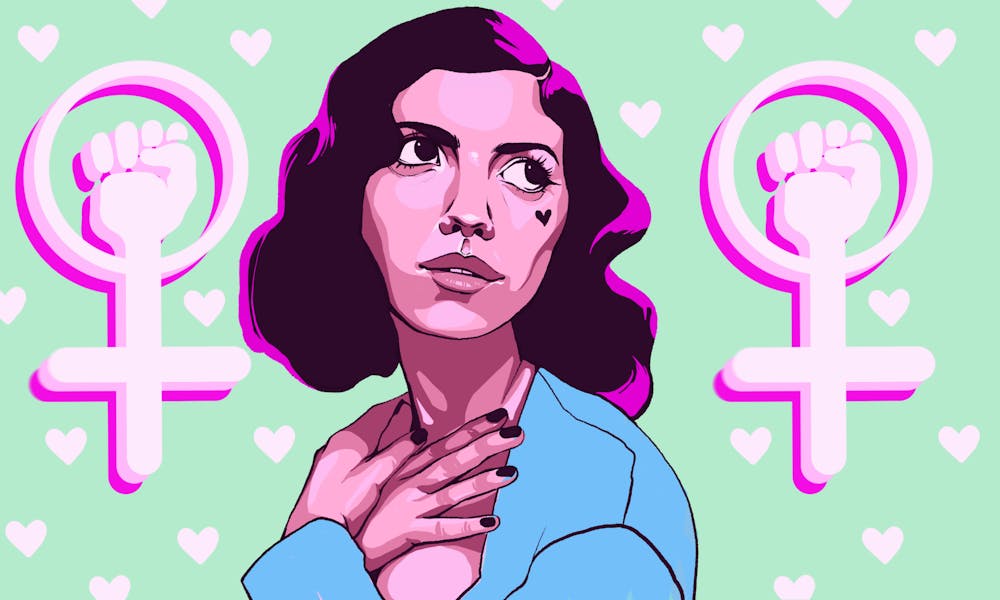A decade after her debut with The Family Jewels, Marina Diamandis has officially become a feminist.
The act of a political “coming out” is not new—in the case of Taylor Swift, those exact words were used to describe when she revealed herself to be a Democrat near the tailend of 2018. Diamandis (also known as MARINA and formerly known as Marina and the Diamonds) does not have as neat a reveal, but the music she has produced in her career has slowly revealed such a change, for better or for worse.
“I don't wanna live in a man's world anymore,” Diamandis declares in the aptly titled “Man’s World,” released in 2020. The statement is a far cry from lyrics in her earlier albums; “Look like a girl but I think like a guy,” she says in “Girls,” released in 2015.
“Girls” is a rather typical not–like–other–girls anthem. The singer gets bored of what other girls say of the calories they eat. She prefers apple pie to their yogurts. At the time that it was released, however, it was the sort of song that girls my age then—preteen and perhaps wishing to be staunchly different from stereotypes of women—would be attached to.
Despite expressing the frustrations in an obnoxious, frequently criticized manner, “Girls” is, at its core, still a rejection of what society expects from a woman: “not meant to fight dirty” and to “never look a day past thirty.” It’s not a wonder that it’s compelling, even to me now. It’s raw, relatable and nostalgic in the sense that you might look back at your previous self to either laugh or cringe, and imminently catchy. As long as there’s some self–awareness in recognizing what the lyrics are saying, the song is still a bop.
“Man’s World,” ridiculously enough, feels flat in comparison.
“Do you really want me to write a feminist anthem?” Diamandis asks in “Can’t Pin Me Down,” released in 2015. “Can’t Pin Me Down” reads more as postfeminist more than anything else, an assertion that it’s okay to be a housewife or not actively a feminist, with fits in with the mixed feminist messaging of Diamandis’s earlier work.
In “Man’s World,” Diamandis does write a feminist anthem. It has all the basic hallmarks of one, and Diamandis even goes a few steps further than what you might ordinarily expect: the music video features a rather diverse cast and the song and music video were produced entirely by women.
From a musical standpoint, I don’t view it as compelling as some of her previous work. I’ll admit that I dislike the more polished, alternative pop style Diamandis has gone on since dropping the “and the Diamonds” from her stage name. Going from the electropop of Electra Heart and synthpop of Froot to the far more musically generic LOVE + FEAR is something I am personally not a fan of.
The most glaring misstep in “Man’s World” is the post-chorus following the second chorus. The song slows and becomes preachy as Diamandis says, “If you have a mother, daughter or a friend / Maybe it is time, time you comprehend / The world that you live in ain't the same one as them / So don't punish me for not being a man” over a stretch of time that feels much longer than those four lines. Coming out from a respectably catchy chorus, the pace is shattered; this is the point of the song. There’s no room for subtlety or implication. “Man’s World” is a feminist anthem, and you will know it.
I prefer “Girls” to “Man’s World.” It’s not that not–like–other–girls anthems are somehow inherently more radical than what “Man’s World” is. Instead, it’s that the raw, emotional appeal of them is often easier to get in line with than what can feel like a facile sermon, especially if you’re already aware of the messages' nuances. In feminist anthems like “Man’s World,” the message overwhelms the song and presumes that the listener is someone who needs to be taught.
That’s not to say that good songs can’t be feminist. There are brilliant feminist works that lie more along the “Man’s World” style of explicit feminism, rather than the more complicated narratives in “Girls” or “Can’t Pin Me Down.” Janelle Monáe’s Dirty Computer is a gorgeous album. Rina Sawayama's Sawayama is punchy and intense.
Part of the difference might be in the backgrounds; Monáe and Sawayama are both bisexual people of color, and their lyrics tend to reflect a fuller feminism. "Man's World" isn't exactly mind–blowing, revelatory feminism. However, to me, the primary distinction lies more in the craft of the messaging. On the scale of white, neoliberal feminism, “Man’s World” is not off the charts. It’s also not a brave, dramatic “coming out as a Democrat” marketing moment. Diamandis doesn’t feel as though she’s attempting to commodify feminism in the #girlboss manner you might expect to see.
But “Man’s World” reveals the difference between what might become a feminist anthem and a song explicitly written to be a feminist anthem. Interpretation can be half the game, and listeners are usually sharp enough to pick up on implicatures without them being spelled out. In an attempt to hammer its point across, the song sacrifices elements of subtlety, cohesiveness, and pacing that often make songs enjoyable to listen to. The song bends to the (rather weak and generic) message, rather than carrying it.
The danger is setting out to write a feminist anthem is that you might end up with just that: only a feminist anthem.

